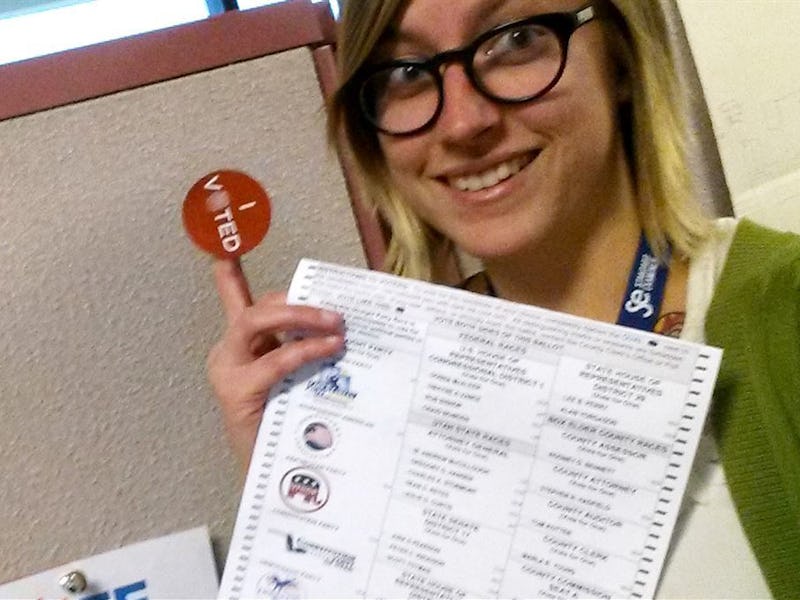Snapchat Says Ballot Selfie Bans Infringe on Its "Newsgathering" Rights
Ballot selfies are good for business -- if your business is mostly selfies.

In New Hampshire, a legal battle continues to unfold that seeks to settle, once and for all, your right to ballot-selfie. (Yes, that is now an actual compound verb.) Last year, the state in which you’re supposed to Live Free or Die overturned a ballot-selfie ban, but the appeal process is underway. Snapchat just joined the argument with an amicus brief.
The laws vary state-by-state. In some states — Wisconsin, Illinois, and Indiana — it’s a serious felony to ballot-selfie. Three states have laws upholding your right to take a picture with your ballot, but New Hampshire is not altogether motivated to join those few.
It is one thing to say that the field of candidates is so bad that you’d vote for your dog; it is quite another to show that you wrote in your dog to be New Hampshire’s next U.S. Senator.
– Snapchat
Snapchat’s argument as to why they should is historical, constitutional, and pragmatic.
The historical argument runs as follows: The people of yore viewed voting as a social, jubilant event. Even today, people love the I Voted! stickers. Social media practices prove that people still very much value their right to share their political participation and even leanings: The amicus argument claims that, already, “two-thirds of social-media users use their accounts for political or civic purposes, such as sharing political content and encouraging others to vote.” Allowing ballot selfies would rejuvenate voters — especially, Snapchat says, young voters, whose participation is most pitiable. It’d bring back the excitement. (If I can take a ballot selfie, I guess I’ll go vote, one imagines a millennial musing.)
The constitutional argument, not unsurprisingly, centers on the First Amendment. Citizens have the right to free speech and, therefore, political expression. Snapchat thinks it, too, has a First Amendment right to newsgathering. It aims to report on the news, and it argues that ballot selfies are newsworthy and informative. Laws banning ballot selfies “impose real restrictions on expression and newsgathering as they have evolved in the 21st century. And New Hampshire’s ‘ballot selfie’ law is no exception,” the company’s lawyers write.
And that’s where the pragmatic argument comes in. Voters, if allowed to take ballot selfies, will be able to expose voting issues as they occur. Snapchat, if voters are allowed to so expose, can make those issues known. In addition, younger voters — given new social pressures — will be incentivized to vote. What was once an ephemeral button declaring one’s political participation now becomes an ephemeral Snap. “And because it is tangible proof of how a voter has voted,” the lawyers say, “a ballot selfie is a uniquely powerful form of political expression.”
It’s not up against much: The opposition is mostly arguing that, if ballot selfies are allowed, people may buy votes. If you can prove — e.g. with a photograph — that you voted as your briber told you to vote, then there’s no stopping such bribery, as the argument runs. Snapchat thinks that that’s ludicrous and would very much like evidence of such voter fraud. Regardless, it thinks the benefits are obvious enough.
It’s also evidently confident in voter patience: With some people, there’s no telling how long it’ll take to get the perfect shot. O, glorious ballot selfie, welcome to the vernacular.